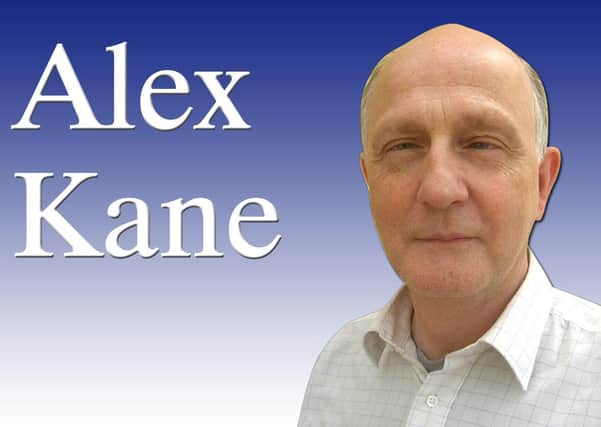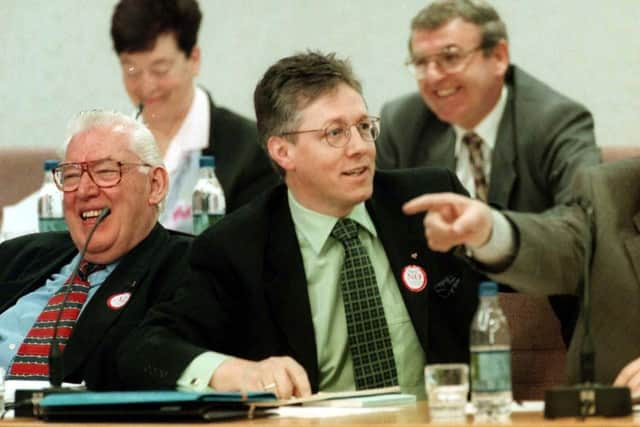Alex Kane: Edwin Poots isn’t strong enough to slap down internal opposition


Their exit was greeted with jeers and at least one shout of ‘bye-bye dinosaurs’.
I saw that look two weeks ago, when members left the fractious meeting which ratified Edwin Poots as leader.
Advertisement
Hide AdAdvertisement
Hide AdThe same look, indicating the same question: what do we do now? In May 1998 the party knew it had a problem requiring an answer. It had answers then: I’m not sure it has them now.


The game-changer in 1998 came weeks after the referendum, when the assembly election left pro-agreement unionism and David Trimble weakened (201,510 to 206,657).
The DUP had a simple choice: kill the agreement (which it could have done if the 28 anti-agreement MLAs had walked), or find an argument for staying (knowing Tony Blair wouldn’t support a return to the drawing board if they walked).
The strategy settled on is best described as the ‘better deal, fair deal’ strategy.
Advertisement
Hide AdAdvertisement
Hide AdIt was a while before that language entered the public domain, although it had been obvious for some time it reckoned relentless pressure on Trimble from within his own party, from Sinn Fein (refusing to help a man they knew couldn’t deliver in exchange for any compromises they would make), and the DUP itself, would force a change in assembly dynamics.
That came in November 2003, when the election saw the DUP and Sinn Fein nudge ahead of the UUP and SDLP and win half the seats between them.
A few weeks later Jeffrey Donaldson, Arlene Foster and Norah Beare defected to the DUP.
Yet again the DUP had a choice: cut a deal with Sinn Fein (which was now the majority voice of nationalism in the assembly), or try and force a major rewrite of the agreement (to deliver on their ‘better deal, fair deal’ promise).
Advertisement
Hide AdAdvertisement
Hide AdBeing the DUP it did both: cutting what I described at the time as their ‘ourselves alone’ deal with Sinn Fein, making some cosmetic changes to the agreement and covering their electoral back with an arrangement which put the choice of first minister in the hands of the largest party, rather than the largest party of the largest designated community.
It was a decision which carried a lot of risks, mostly in the form of internal opposition.
The opposition was faced down and the DUP went on to win 36 seats (and 30% of the vote) in the 2007 election.
Jim Allister (the DUP’s MEP) left the party three weeks later, arguing the willingness to share power with Sinn Fein was a betrayal of all of the DUP’s previous promises.
Advertisement
Hide AdAdvertisement
Hide AdNot being in the assembly weakened his opportunity to inflict internal damage and change minds, which may be one of the reasons he founded TUV nine months later.
When the ‘Chuckle Brothers’ relationship between Ian Paisley and Martin McGuinness became an issue for the DUP in early 2008 the party acted ruthlessly.
I accept Peter Robinson’s claim in a recent News Letter column (‘Contrast the dignified exit of Ian Paisley as DUP leader with the humiliation of Arlene Foster,’ June 4, see link below) that he tried to make the coup (and there really is no other word for it) as easy as possible for Paisley, yet there is no doubt that Paisley was being dumped, whether he liked it or not.
The numbers were marshalled in advance and he was presented with a fait accompli: we’re sorry to see you go, Big Man, but here’s your coat and your Homburg.
Advertisement
Hide AdAdvertisement
Hide AdAnd within weeks the leadership of the party and his roles of first minister and moderator of the Free Presbyterian Church had been stripped from him.
The party acted ruthlessly for two reasons: to pull the rug from under the potential threats posed by Jim Allister (formidable even in his occasional off days); and, more important, to keep the assembly and executive on the road.
Because by the summer of 2008, the assembly was the be-all-and-end-all priority for the DUP: and, with the exception of the TUV and a few loyalist outliers, it was the priority, too, for mainstream unionism, the Orange Order and the groups now embraced by the Loyalist Communities Council.
Yet today, Edwin Poots isn’t strong enough to slap down internal opposition, not least because there is so much of it and his enemies are happy to be seen in plain sight.
Advertisement
Hide AdAdvertisement
Hide AdDoug Beattie and Jim Allister are attracting as much attention as is he and that’s not good news for a leader who wants to up his profile as the new kid on the political block.
The Orange Order; Loyalist Communities Council; and the mushrooming organisation Unionist & Loyalist Unified Coalition aren’t on the same page as him on some key issues (especially on response to the Protocol); and he will be worried by the number of anti-DUP posters on view at recent protests.
I’ll leave you with a recent email to me from someone who joined the DUP in 1979: “The DUP’s real problem began in January 2016. It no longer has a Peter Robinson-type figure to run or oversee every single aspect of the party the way he did from 1975. He wasn’t always loved or liked, but he could spot a problem a mile away and fix it. He made the party in his image, not Paisley’s. Why do you think it has stumbled from one disaster to another without him”?
A weak leader needs a Robbo at his side. But from what I can see the DUP doesn’t have anyone to occupy that role.
And that may be Poots’ biggest problem of all.
Advertisement
Hide AdAdvertisement
Hide Ad• Peter Robinson: Contrast the dignified exit of Ian Paisley as DUP leader with the humiliation of Arlene Foster
——— ———
A message from the Editor:
Thank you for reading this story on our website. While I have your attention, I also have an important request to make of you.
With the coronavirus lockdown having a major impact on many of our advertisers — and consequently the revenue we receive — we are more reliant than ever on you taking out a digital subscription.
Subscribe to newsletter.co.uk and enjoy unlimited access to the best Northern Ireland and UK news and information online and on our app. With a digital subscription, you can read more than 5 articles, see fewer ads, enjoy faster load times, and get access to exclusive newsletters and content. Visit https://www.newsletter.co.uk/subscriptions now to sign up.
Advertisement
Hide AdAdvertisement
Hide AdOur journalism costs money and we rely on advertising, print and digital revenues to help to support them. By supporting us, we are able to support you in providing trusted, fact-checked content for this website.
Alistair Bushe
Editor